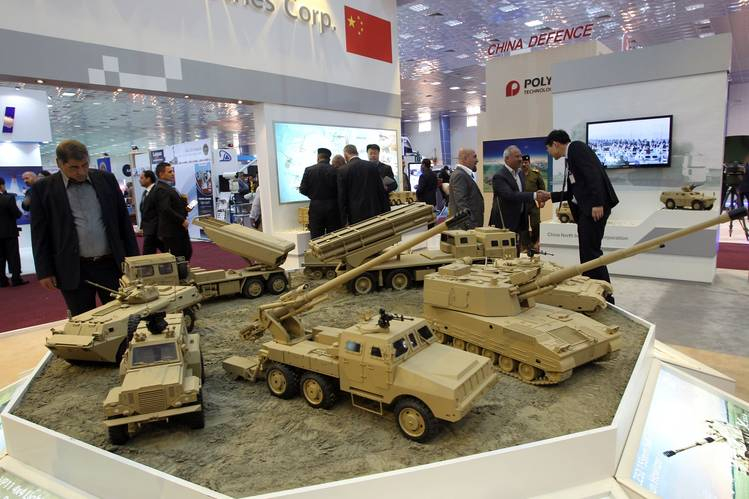China is looking to expand its military and economic influence in Nigeria, Africa’s most populous and largest economy, by establishing its military industry in the country. This was revealed by the Ambassador of China to Nigeria, Cui Jian Chun, during his visit to the Minister of Defence, Muhammad Badaru Abubakar, in Abuja last November.
According to Chun, China wants to support local production of military equipment in Nigeria, which has abundant natural and human resources that can benefit Chinese corporations based in Nigeria. He said China has an interest in forging collaboration with Nigeria in the area of military operations, economic cooperation, and international cooperation.
“Nigeria is a large country just like China and we are willing to build our military industries in Nigeria to support local production of military equipment,” Chun said, according to a statement by Ministry of Defence spokesperson, Henshaw Ogubike.
Chun also said the Chinese industries will not only boost the fight against insurgency and other related crimes in Nigeria, but also the Federal Government’s drive on employment generation. He added that China and Nigeria have investments in security, education, and economy, and that Nigeria has great potential to develop a new economy.
The Minister of Defence, Abubakar, welcomed China’s interest in Nigeria’s defence sector and said the Federal Government would collaborate with the Chinese government in technology transfer, intelligence sharing, and military training in its quest to tackle insecurity in the country.
He said there has been a lot of working relationship with the Chinese companies on the transfer of technology and talk on military equipment production.
The move by China to establish its military industry in Nigeria comes amid growing concerns about China’s expanding naval presence in the Gulf of Guinea, a strategic waterway that hosts vital shipping lanes and oil reserves. According to a report by SBM Intelligence, China has been involved in counter-piracy operations in the Gulf of Guinea and has conducted security exchanges with countries in the region.
Recent U.S. intelligence reports also said that China is seeking a naval base in Equatorial Guinea’s Mainland Port of Bata, which could pose challenges to Western powers in the region. US defence officials have expressed worries that China is seeking a base on the Atlantic coast to support naval units and repair warships. The United States announced that it plans to actively thwart this I initiative.
One the other hand, Nigeria is seeking to boost its defence industry by collaborating with a leading US military firm, NEANY, to establish advanced weapons production lines at the Defence Industry Corporation of Nigeria (DICON).
China’s push into Nigeria’s defence sector also aligns with its broader ambitions to secure energy interests and expand its influence in Africa. China has invested heavily in Nigeria’s oil and gas industry and aims to increase daily oil production. China is also Nigeria’s largest trading partner, with bilateral trade reaching $19.27 billion in 2019.
However, 50 years of Nigeria-China relations has been a bitter-sweet mixture, as some analysts have pointed out. While China has provided loans, grants, and infrastructure projects to Nigeria, it has also faced criticisms for its debt diplomacy, environmental degradation, and unfair trade practices.
As Nigeria and China mark the golden jubilee of their diplomatic ties this year, the potential establishment of a Chinese military industry in Nigeria could be a game-changer for the bilateral relationship, as well as the geopolitics of the region.
Chinese defence companies have enjoyed export successes in Africa
Meanwhile, China’s prominent defence enterprise, Norinco, has made a significant move by inaugurating a new office in the capital city of Senegal, Dakar, another West Africa nation. This strategic step reflects Norinco’s burgeoning footprint in West Africa’s military procurement arena.
Heading this new regional office is Zheng Yun Gang, a seasoned professional with over two decades of experience in the defense sector. In his role, he will spearhead the expansion of Norinco’s operations not only in Senegal but also across other West African nations.
Beyond Senegal, Norinco has established regional offices in Nigeria, Angola, and South Africa. Additionally, there are plans to expand further into more West African nations in the near future.
Some of Norinco’s recent activities in the region includes; Supply of VN1 8×8 infantry fighting vehicles for the Gabonese Scouting, Reconnaissance, and Combat Squadron component of the elite Republican Guard Armoured Intervention Group.
Over the years, Chinese defence companies have enjoyed export success to African militaries.
The Gabonese Republican Guard (GR) also acquired some Norinco VP11 mine-resistant ambush-protected (MRAP) vehicles which was publicly for the first time during the 17 August Independence Day, 2022 military parade in Libreville.
Nigeria has procured a wide variety of combat systems from China which includes 105 mm Fire Support Vehicle, VT-4 Main Battle Tank, SH-5 105mm self-propelled Artillery System, and SH-2 122mm self-propelled artillery systems. These hardware arrived in April 2020.
Subsequent delivery of additional hardware comprising of VT4 main battle tanks, ST1 120 mm tanks destroyers, SH2, SH4 self-propelled artillery, and KIA tactical vehicles arrived in October 2020.
The Nigerian Army already operates 120 NORINCO CS/VP3 Mine-Resistant Ambush Protected Vehicle (MRAP) delivered in 2015.
Late 2021, the Tanzania People’s Defence Force (TPDF) improved upon its 15-strong Chinese Type 59G main battle tanks with new Norinco VT-2 main battle tanks.
Meanwhile, the Malian military government led by Colonel Assimi Göita has recently acquired a large number of VP11 4×4 Lightweight MRAP, and Lynx CS/VP11 ATV made by Norinco, a Chinese arms manufacturer to aid in the fight against insurgency.







